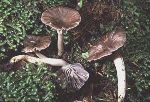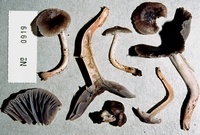|
 Camarophyllus griseorufescens Camarophyllus griseorufescens
BiostatusPresent in region - Indigenous. Endemic
Images (click to enlarge)
Caption: Fig. 22 Camarophyllus griseorufescens Horak. (A-C: PDD 27230,
type): A. basidiomes. B. spores. C. basidia | 
Caption: Camarophyllus griseorufescens
Owner: Kaimai Bush | 
Caption: ZT0919, Holotype
Owner: E. Horak: © Creative Commons Attribution-Noncommercial 3.0 New Zealand |
Article: Horak, E. (1990). Monograph of the New Zealand Hygrophoraceae (Agaricales). New Zealand Journal of Botany 28(3): 255-306 (http://www.rsnz.org/publish/abstracts.php).
Description: Pileus -50 mm, broadly campanulate becoming expanded or concave with (and rarely
without) obtuse umbo; grey, occasionally with pale lilac or brown tinge over
disc, dry, minutely fibrillose, hygrophanous, margin striate. - Lamellae 10-15
(1 -3) arcuate to decurrent, sometimes with emarginate tooth, often anastomosing,
pale grey, often with fuliginous or brown tinge, edges concolorous, entire,
obtuse. - Stipe 20-60 x 2-5 mm, cylindrical, equal but often attenuated at base;
whitish to silver grey when young, base changing to pink or orange-red in aged
basidiomes; dry, glabrous or minutely fibrillose, hollow, brittle, single or
caespitose. - Context grey in pileus and upper portion of stipe, pink to orange
in base of stipe. - Odour and taste not distinctive. - Chemical reactions on
pileus: KOH - negative.
Spores 5.5-7 x 4.5-5.5 um, subglobose to broadly ovoid. –Basidia 30-50 x 6-7
um, 4-spored. - Cystidia absent. - Pileipellis a cutis of interwoven, Cylindrical
hyphae (3-8 um diam.), membrane not gelatinised, minutely encrusted with pigment;
clamp connections present (Pl. l, Fig.5).
Habitat: ECOLOGY: Scattered; saprobic on soil among litter in broadleaved-conifer forests
(Metrosideros, Weinmannia, Schefflera. Dacrydium, Podocarpus). March-June.
Distribution: DISTRIBUTION: NZ (NA,WL).
Notes: ETYMOLOGY: griseus = grey; rufescens = reddening.
One of the most distinctive macroscopic characters of this taxon is the reddening
context in the base of the stipe. For this reason, in the field Camarophyllus
griseorufescens can be taken for Hygrophorus gloriae whose pileus
colour occasionally ranges from grey to soot brown. The two taxa differ, however,
by the odour, and - even more significantly - by the size and the shape of the
spores.
|